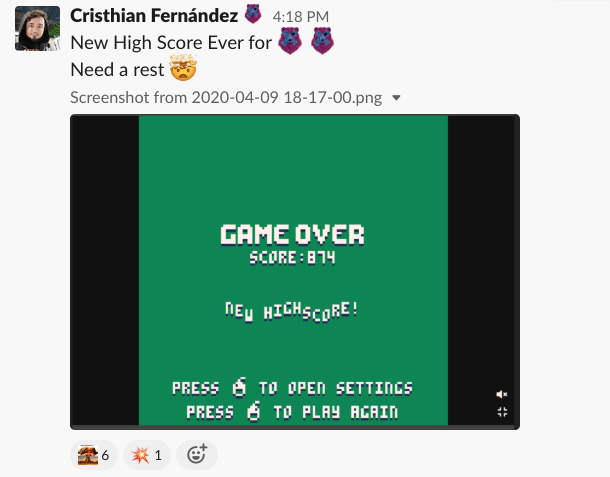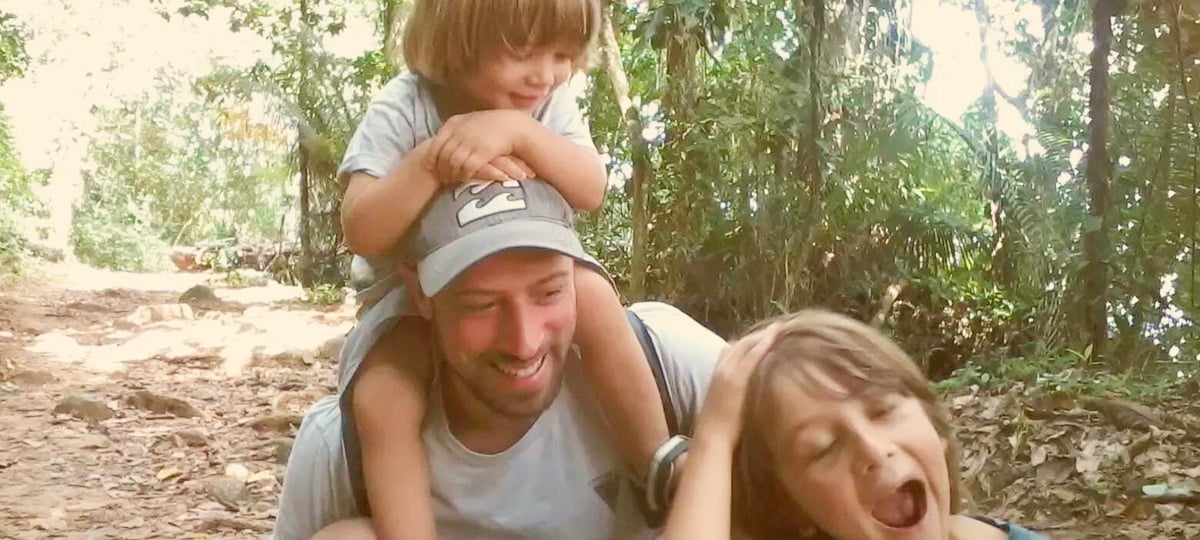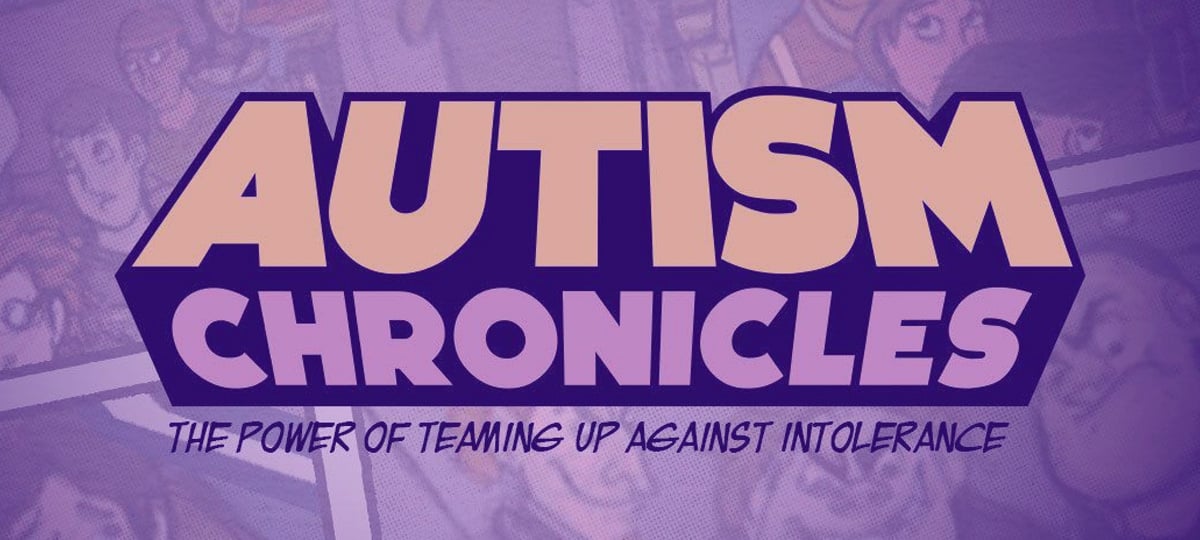
In a post-COVID-19 world, we're seeing a lot of conferences, meetups and events moving to a remote format. But like anything that moves remote (like an office), you have to respect the async nature of the remote format to not only be inclusive, but get the highest engagement.
The offline conference model works very well because people are physically present and committed. But when work is just a tab away, watching 8 hours of talks on your computer is unlikely. You also miss out on great content when talks are stacked.
For that reason, we created FwdConf, our take on how a remote conference should be done:
-
Entirely async, participate on your own time.
-
Podcast format roundtable talks to enjoy wherever and whenever with ease. Also streamed on our radio station for listening parties.
-
Slack roundtables to continue those conversations with others.
-
24-hour async arcade competition to rekindle the energy mid-week.
-
Limited time (1 month) challenges (called 'Bounties') related to the talks, with collectible rewards for doing them.
-
...and much more.
While we tossed in a few live events on the X-Team Radio for this week, we're leaning in on the async nature to make an event that you enjoy on your time while still getting to be inspired and connect with great minds.
The first FwdConf is exclusively for the X-Team community, but below we're also sharing some of the content for the global community to enjoy as well.
Day 1: State of Serverless 2020 + Building your own product as a dev
Day 2: How to Be a Better Dev Mentor
Day 3: Living and Working Remotely in Japan as a Foreigner
Day 4: State of Location Independent Life 2020
Day 5: Parenting Life as a Remote Worker
Day 1: State of Serverless 2020 + Building Your Own Product as a Dev
Today we dive into the ever-popular world of serverless, a trend sweeping the world of DevOps for many companies. We speak with Rafal Wilinski, one of X-Team's resident serverless experts, on a variety of serverless topics, while also diving into the must-hear, inspiring story behind how he built his own success serverless product.
Full session on Spotify:
👉 Can't access Spotify? Use Anchor.fm.
Why does serverless matter now?
"This sub-branch of engineering is innovating really fast, I would compare the pace of innovation to front-end development where every month there's a new JS framework." - Rafal Wilinski
How does the serverless community feel about being locked in to Amazon/Google/Microsoft in order to have a serverless architecture?
"You can kind of defend from being locked into one cloud provider by using some architectural patterns like a hexagonal architecture...but if you really want to unleash the power of the cloud, you have to commit to that (lock-in)."
How do you choose between the big 3 serverless vendors?
"Many times they have one really good working service that's essential for your business, and because of that, you choose it as your cloud provider. Many times it's also driven by the business, purely on costs."
Can you write Lambda functions in multiple languages?
"Most are written in Python and Node.js, but recently AWS introduced layers...which allows you to run any kind of language you can imagine."
Where is the innovation coming from in the serverless ecosystem, the open source community or the cloud providers?
"The open source community is not sleeping, they are constantly improving the developer tools, they are constantly improving the ways you can use those cloud providers."
How important is it going to be for devs to have serverless experience in the next few years?
"I think it's going to be more and more important because I feel like we're moving away from this traditional model of the division between the front-end and the back-end."
Tell us the story of how you built your own serverless product as a developer.
"I've learned so many things, it's just amazing to see other people e-mailing you everyday saying 'This is a great thing, this is really useful, I'm going to pay for it'. There's so much joy from this human factor when someone appreciates your work. There's so much value in those conversations. It's not just a product for money, it's a product to meet other people, to hear their stories, to make something for them, and to collaborate with them. So I think it's really a gateway to something bigger.
Slack Q&A Highlights:
Are enterprises using serverless?
Rafal: Lego, Nike, Capital One and much more. Tools and practices are already there and they prove it.
By launching a product, what type of challenge you were not expecting but had to deal with?
Rafal: I’m always amazed by the difference of what I think is needed and what our customers actually want. Regarding marketing: the thing that works for us is "Doing things that don’t scale” - reaching out personally to each of our customers, talk with them about their problems and our ideas how to solve them. It’s more about dialog and partnerships. Sometimes we implement things specifically just because one person needed that, and in exchange they buy our software. The human touch element and being simply honest does wonders.
Can you give us your 2 cents on cold start, current state, how to mitigate and are we to expect this issue to go away?
Rafal: "The question is - is it a concern actually? For most people - no. If you’re using runtimes like Node, Go or Python, it’s already less than 500ms. Cold Starts are a problem for JVM based languages and it’s solved there using “Provisioned Concurrency”. But to me it feels like we’ve made a full circle because we’re back again at provisoning something and using autoscaling for that too…"
Have you come across any comparisons or talk about the sustainability of the different serverless providers?
Rafal: "As far as I know, right now Google is “the greenest” with over 40% of energy from renewable resources. But Amazon, as far as I remember. also committed to create new regions fully powered by renewable energy."
How big a deal is training for AWS/etc. and what advantages does it give you beyond someone being confident in your skills?
Rafal: "It basically opens your eyes on many really powerful tools and how to use them efficiently. For me, it totally changed my way of thinking about engineering: from coding, to problem solving by using code as a glue, only as a necessity if other option is not possible.
It’s more like using lego blocks, not creating them. Want to rollout simple CRUD? What’s the point of writing same factories/entities/repositories/controllers for N-th time? There’s nothing exciting or productive about it. Just use AWS Amplify + AppSync, create schema and AWS takes care of everything else - logic, API, persistence, security.
Wanna roll out your own Authentication, federation and authorization? Good luck with creating all the logic like merging accounts from multiple sources, resetting passwords, creating groups, permissions, encryption or adding 2FA support, not to mention underlying infrastructure with established SLA. That’s months of dev time or justamplify auth addwith AWS Cognito.
I can go hours on how many use cases are already covered by Amazon’s Services and their bright minds. You can reinvent the wheel, or leverage their battle tested solutions to actually create something useful for humanity."
How easy is it to limit AWS resources to stay under the limits and keep it free?
Rafal: "You cannot stop AWS from provisioning. You can only setup some alerts and budgets but they are only notifications. So mistakes can be expensive but AWS is always forgiving if you do some rookie mistakes like leaving 100 heavy instances running overnight :P"
Jump ahead in the conference
Day 3: Living and Working Remotely in Japan as a Foreigner
Day 4: State of Location Independent Life 2020
Day 5: Parenting as a Remote Worker
Day 2: How to Be a Better Dev Mentor
One thing we've learned over the years about developers is that the most successful ones all have one thing in common: they are dedicated to mastering the discipline and the art of mentoring. When mentorship is at the core of a team, it truly becomes unstoppable. Today's guests have mentored developers for many years, and they will undoubtedly inspire you to think beyond yourself.
Featuring: Kasper Myram, Josh Johnston, David Roberts, Nikole Garcia
Hosted by: X-Team CEO Ryan Chartrand
👉 Can't access Spotify? Use Anchor.fm.
What is mentoring really all about?
How do you give better feedback on Github PRs?
"When you're trying to encourage someone to do something in a different way, you can' just say 'this is better [if you do it this way]', you need to explain what is the benefit – whether it be to that person, the codebase, the company as a whole – what is the benefit and why should I adopt this different way of doing this thing I've been doing wrong before?" - David Roberts
How do you mentor someone after they make an epic fail?
How can you be a patient mentor when a dev is being challenging?
"For me it's about: can I at least see they are moving in the right direction? And sometimes it's not anybody's fault; it's the wrong chemistry, the wrong timing, and a person is not fit for a certain project." - Kasper Myram
"Are they actively continuing down that path? In which case you might not be able to help. But if that person isn't happy that that's how they're behaving, then certainly you can empathize with that...and if those people really want to make amends, the whole team will want to rally around them and we'll all fix it." - David Roberts
How can you mentor someone using Slack journals?
"If you can make your thought process as transparent as possible, you'll be helping other people, you'll be learning so much yourself, and the more people do it, the less scary it becomes." - Josh Johnston
How can mentoring help you impact your local community?
"It's helping the world [my kids] will grow into, and it's helping what I see every day in the news...Focusing on what you can do in the 10 square miles around you makes you feel like you have a little more control, a little more impact in the world, and so it's saying 'how can I make this little place I chose to call home better?'" - Nikole Garcia
Mentoring helps you shape the world around you, whether that's your team or community.
Slack Roundtable Highlights
Examples of small ways to mentor someone:
"I think it is always helpful to understand how the other person talks, how he/she express, what he/she likes, etc... because by knowing that, you can create metaphors, analogies, better examples, and a better environment of work/learning/etc." - Cristian Morales
"What worked well for me (both communicating with my mentees and also with friends in masterminds I belong to) are regular accountability calls. sometimes all it takes is asking about the progress and sending some encouragement along the way, pointing in the right direction if needed.another note. I’ve found out that it’s good to not only suggest next tasks to your mentees, but also set deadlines or ask them to report to you regularly. this both lets you better track their progress but also help them be more focused and consistent. (works well for people who are yet to find their own drive and passion and require external triggers instead.)" - Wojtek Zajac
Another big part of mentoring is to help mentees build self-confidence, share ideas, speak out. One thing to remember is that mentees tend to see mentors as super-heroes and when the mentor suggests an idea of how to solve something, mentees may take those words as instructions and not a suggestion, a mentor's words come with some weight, mentees might have a plan, that might be better, but was silenced hearing mentor's possible solutions. Mentors should help others gain confidence to speak out on meetings, to start discussions, ask questions to understand the requirements, ask for help without feeling dumb, to help mentees become mentors. This is achieved by those small moments when mentees feel that their opinions are heard, encouraged and that their growth matters to the mentor." - Marcos Navarro
On learnings from X-Teamers' mentors:
"And the one thing I recall to this date is to leave a codebase better than how you found it. Never settle for just enough, doing small cleanups pay off in the long run, even if they serve only for readability purposes by making things easier for the next developer." - Ariel Diaz
On first steps to help mentor a community:
"There are multiple ways how to maximise your influence and output to help more people without leaving your room.with such a huge amount of people who suddenly found themselves with extra free time right now, there are multiple opportunities.
• Start a newsletter! I t’s the next big thing.
• Contribute to community groups (even link roundups work!)
• Start a podcast or a youtube channel with live coding
• Be creative when creating content (blogs are oldschool, but there’s still so much potential in Instagram stories)
Who said mentorship needs to mean helping people 1:1?" - Wojtek Zajac
"LinkedIn also has a feature that allows you turn on notifications to mentor people; I’ve had a number of people reach out to me through that platform over the years. Other than that, I kind of just follow the philosophy of altruism — if I can help someone, I do it with no expectation of any reward or return. People will always remember if you did them a favor, and it can work out really well for you if you treat everyone like equals who approach you." - Sam Seliger
Events You Missed:
X-Team Radio Mystery Challenge (Gaming Edition): X-Teamers got on X-Team Radio for a live competition trying to guess the video game theme song playing.
Vault Drop: The Vault introduced two new WFH collectibles to work from home in ultra comfort with style.

Jump ahead in the conference
Day 4: State of Location Independent Life 2020
Day 5: Parenting Life as a Remote Worker
Day 3: Living & Working Remote in Japan as a Foreigner
One of the biggest ways to learn and grow is to embed yourself in another culture. You not only learn another language, you learn more about how to get the most out of life. Our guests today have lived and worked remote as foreigners in Japan for many years, and we'll dive into the challenges they went through and how it's helped them grow and move forward.
Featuring: Paul McCrodden, Chris Burkhardt
Hosts: Ryan Chartrand, Thomas De Moor, Josh Johnston
👉 Can't access Spotify? Use Anchor.fm.
What's Japan's view on remote working?
"In Japanese society, loyalty and community is the biggest thing when you're working for a company. And community doesn't mean in Slack." - Chris Burkhardt
What's it like working for a Japanese company?
"Whatever the job, people really own it here and they do their best. There's a level of trust in the whole community and the society." - Paul McCrodden
"They have 'black companies' where people are working 80-100 hours a week. And I had to sit there until the boss left, and that was it." - Chris Burkhardt
What aspects about Japanese culture inspired you in a positive way?
"Having more patience and being more relaxed are something I got from here... Everyone is really concerned about how everybody feels here. People are just really friendly and they don't like to cause problems, they don't like to cause issues." - Chris Burkhardt
"Being more conscious about the things that you're saying and doing that can put someone else down or put down someone else's positive action. There's a lot of this being conscious about what you're saying or doing, which I think is a good thing." - Paul McCrodden
How difficult is the language barrier when trying to live there as a foreigner?
"If you don't come here with full (Japanese) proficiency, you won't be able to survive here." - Chris Burkhardt
Is living in Japan a good long-term living option as a foreigner or not?
"Being here is a great incubator for family. Children have a great life here, they get a good education here, they learn about the meaning of hard work... If you can get here and stay here, you're going to have a good life here. Clean air, friendly environment, safety, and the trade-off is you won't be able to do very much for yourself."
"If you're trying to be someone who is trying to act proactively and change things, it can be a real challenge. Long-term, being here you're going to be up against it in certain ways." - Paul McCrodden
Slack Q&A
Do Japanese people appreciate when foreigners try to speak Japanese?
"As the English education here is poor and focuses on written English more, even though people have spent many years in school with it, the level is very low. So there is a sense of genuinely being impressed if a foreigner speaks Japanese, even though it might be the same few words they repeat or even 1 word at times :)" - Paul McCrodden
"Japanese people appreciate hard work. When a foreigner makes an effort to speak Japanese its seen as an embrace of the culture and appreciated. It is true that Japanese people find English very difficult to learn, so in there minds, they believe that Japanese is even harder. Any effort to learn or speak is always greeted with praise." - Chris Burkhardt
If someone was looking to move to Japan for a year or so, would you recommend they move to a city, or somewhere more rural? I have heard some conflicting reports on what's better for people when trying to absorb the culture/learn the language.
"I have lived in Hokkaido, Tokyo, Kyoto and Ishikawa. I would live in Kyoto if I were you. Tokyo is too big for me, and Ishikawa or similar places is in some ways too rural to start off with. Kyoto has a great balance. It is more traditional Japan, that has lots to offer, from quiet mountain temples, to busy touristy/shopping center/city stuff. It’s got endless things to offer, you can just walk around it and always find something new like a beautiful Japanese garden where you can sip green matcha and look into a peaceful creation, but still be right center of Kyoto. If you don’t need to work for a Japanese company, Kyoto is the place to go IMO. Tokyo would have more work opportunities for foreigners." - Paul McCrodden
How far do you find your money going while you're in Japan?
"Ups and downs vs Ireland, some things much more expensive, but others, such as eating out, are much cheaper. I’d say overall, it’s about the same as Ireland, which is expensive country to live in. Costs vary across the country though."
I’ve heard that one hurdle of moving to Japan is that a lot of landlords simply won’t rent to foreign folk
"It could be true, but I have not experienced that. I have usually gone with “English-friendly” places, as how else could I even begin to rent, or even find out about the places? I am connected with the owner of JStays in Kyoto if you ever go there for mid-long term rental if you are interested. In Tokyo, I think I used a place called “Sakura House” to rent a place for a month, like a room in a shared house before AirBnb was a thing here." - Paul McCrodden
How did you adapt to the weather?
"Summer is a bit of a killer here, but I’m in the mountains beside a river, so I get a river breeze that helps. Kyoto is in a river basin, it’s a nightmare in summer. You live in Aircon places for a month or 2. I felt like having a shower after every time I went outside. That is a drawback of Kyoto for me, but it’s manageable if you consider the rest of the time is great." - Paul McCrodden
Have you found yourself barred from many places?
"I have not experienced this from what I remember aside from being kicked out of a swimming pool or told at a ryokan (Japanese traditional hotel) that I could only use the onsen at 6 - 7pm when everyone else was having dinner, due to tattoos. Most places that give a bad vibe I wouldn’t want to be in anyway, so it’s for the best to go elsewhere in these cases." - Paul McCrodden
How is the cafe/restaurant culture where you are? One of the things I love doing the most is spending a day working/writing away in a comfortable cafe. Do you find that there are plenty of places to do that in Japan? Or is there a bit too much focus on convenience/street food and people eating in their offices?
"So, it’s likely different in Kyoto, Tokyo and in Okinawa, etc., but where I am most cafés are kind of “themed”. It’s really in an artisan way here with kind of “persona of a customer” the cafe wants to attract. For example, some might not even be child friendly, or some might not want talking, but rather be a meditative place to enjoy a home roasted hand selected coffee bean. Some and in fact about 50% of cafés where I am wouldn’t be laptop friendly. I’d usually ask them when I’m not sure. There’s too much focus on convenience here in general as people are too busy, so there’s a lot of ready-made meals in supermarkets, etc. that salary men eat also. But, again, more globalized places, have both the modern and the more traditional in the same place, such as Kyoto, you’d be able to select with a bit of research things that match your mentioned desires. Be it a work-friendly place, or a traditional place where you focus entirely on what they’re serving you, how it’s prepared, how it’s served and how it’s enjoyed." - Paul McCrodden
Events You Missed:
X-Team Radio Mystery Challenge (Street View Edition): X-Teamers got on X-Team Radio for a live competition trying to guess the country pictured in Street View photos (like this one, can you guess?). Winners won Chrome Dino sets.
Jump ahead in the conference
Day 5: Parenting Life as a Remote Worker
Day 4: State of Location Independent Life 2020
The location independent lifestyle has evolved tremendously over the last decade, and with more and more people entering into that world, it's changing even more rapidly now. Our featured guest today has lived this life continuously for many years, likely more than anyone you know.
Featuring: Wojtek Zajac
Hosts: Ryan Chartrand, Thomas De Moor, Josh Johnston, David Roberts
👉 Can't access Spotify? Use Anchor.fm.
What is the motivation behind living a location independent life for years?
"Moving somewhere else pushes you and makes you fight with your boundaries and see what you're capable of." - Wojtek Zajac
How does the location independent lifestyle help you grow?
"You're throwing yourself into new communities, you're meeting so many new people and this helps you understand what really drives you, what motivates you." - Wojtek Zajac
How do you build and maintain friendships when living location independent?
"I've established such a strong connection with a large amount of people in many different places, so it's difficult to maintain that, but I very often go back to specific places and then I get to reconnect with them." - Wojtek Zajac
What's it like living in multiple countries for long periods at a time rather than a short period?
"You really get to know the culture of a country...and when you can adapt to those cultures, you can kind of go anywhere and be fine. You can be thrown into any situation, it makes you much more flexible." - Thomas De Moor
What is it like living location independent with a family of 4?
"We'd work things out together as a family rather than as 4 individuals and I really loved going through that experience, I think we grew a lot through that time." - Josh Johnston
How important is routine when living location independent?
"The only way to stay sane if you travel frequently is creating routines...doing daily meditation sessions, working out at home instead of gyms since it's quite difficult to sign up to gyms for 2 weeks or a month, or finding accommodation close to coworking spaces...trying to figure this out in advance can save you a lot of time." - Wojtek Zajac
What's dating like when living location independent?
"Dating people in different countries makes you learn so much more about yourself since those people are so different, but also this will make you learn things about the country which you would never learn otherwise." - Wojtek Zajac
What does the future of the location independent community look like?
"It's no longer going to be just people who are coming from Silicon Valley trying to hop on the latest trend, but we're going to see more traditional jobs like teachers, graphic designers, copywriters, there's so many different jobs that you can do remotely and I'm hoping that those people will start traveling more frequently."
Slack Roundtable Highlights
What are the best countries for nomads that are struggle-free, have energizing things to do, and have awesome people:
"I would say Spain, I felt I could move freely there, and I would feel safe and secure to do anything, plenty of places to go, people to know (spanish are very friendly people in my opinion)" - Diego Seghezzo
"For me it was Thailand. Very cheap to stay there as long as you’re not staying in five star hotels. Good food. Beautiful scenery from the beaches, to the mountains, to the jungles. Want to try scuba diving? This is the cheapest and one of the best places in the world to get a scuba certification. Want to become a badass fighter? Go train Muay Thai 3 times a day for 8 weeks. Want to party? Head to Ko Phi Phi for the Full Moon. The people are generally friendly and welcoming, lots of travelers as well." - Sam Seliger
"• Spain/Portugal and Thailand (Chiang Mai, Koh Phangan, Bangkok)
• Colombia (Medellin)
• Indonesia (Canggu is incredible)
• RSA - Cape Town (amazing value for the buck, but quite small community and can be dangerous)
• Central America if you’re into living wild and free. I’ve had amazing time in • Panama and Costarica
• I actually really liked all of Taiwan, Seoul, and HK but all for different reasons (a different story)" - Wojtek Zajac
What about baggage? How do you manage to have clothes for totally different climates?
"Packing is tricky if you switch locations. As a rule of thumb, I try to take 50% less than planned and I try to have some extra space for if I need to adapt and buy extra sets of clothes (I remember shopping sprees in the U.S. before traveling to national parks or in Saint Petersburg when we’ve suddenly realised that Russia is 30*C colder than we thought it would be)." - Wojtek Zajac
Events You Missed:
VS: Mouse Fighter – The three Houses of X-Team faced off in a charity Dodge competition to raise money for our Food Bank Fund, donating to food banks around the world during the COVID-19 crisis. House Nightclaw took the win!

Day 5: Parenting Life as a Remote Worker
Being a parent and remote worker is probably one of the most complex lifestyles you can live today, and one that many are starting to get their first taste of with many schools closed around the world. Today's guests are three X-Teamers who have, after many years, pushed past these struggles and found an incredibly rewarding balance.
Featuring: Diego Seghezzo, Josh Johnston, David Roberts
Host: X-Team CEO Ryan Chartrand
👉 Can't access Spotify? Use Anchor.fm.
How do you stay productive as a remote work parent?
"It takes some kind of system you can set up with your kids that they understand. Something that can be fun for them as well so they know 'Here are the times when I can interrupt and here are the times when I can't.'" - Josh Johnston
"It's a great opportunity to have some fun with them, maybe you put a coloring book page on your door and say 'This door only unlocks when you've perfectly colored this in and slip it under the door when you're done and it unlocks the door.'" - Ryan Chartrand
How do you overcome some of the guilt that comes when you're working and your kids are waiting for your attention?
"There are times when you feel guilty...I am here to be able to help and yet you're locking yourself away on the other side of the door, so that can impact on productivity, and that's why it's good to block out out certain times so those times when there is a meltdown you can go outside and help." - David Roberts
"You're much more aware of what's going on in terms of looking after the kids and dealing with all their ups and downs, it's easy to miss that if you're away [at an office], I appreciate that more and see more of the reason why it's worth helping when I'm not at work, doing more when I'm not at work, because I can see the flow-on effects of that when I wouldn't normally be around." - Josh Johnston
Do you invite your kids into your work to prep them for work life one day?
"It's interesting within my team to introduce them to people from very different cultures, it's really an eye opener. 'This is Paul who lives in Japan' or introduce them to someone from Venezuela. To give that to a child is an awesome thing, usually they have to wait for a holiday to experience something like that, but they can do that on a regular basis." - David Roberts
How do you capitalize on the opportunity of getting to spend more time with your family?
"It's like you refresh your energy to continue working." - Diego Seghezzo
"Being able to have 10 minutes where there's someone else's life and see what your kids are up to or go for a walk, that's a really great way to come back into the next focus session with a much fresher mind. " - Josh Johnston
How do you teach your kids how to code?
Josh recommends micro:bit, a pocket-sized computer, to not only get coding involved but also something tangible.
How do you make time for your own growth as a remote work parent?
"I take learning as part of my duties as a human being, maybe not part of my daily work, but part of my obligation of inner knowledge and unleashing." - Diego Seghezzo
What do you hope the future of work will look like when your kids grow up?
"I hope we don't continue to value time...it's not about working 8 hours, someone might be able to get more done in less hours, but as long as they're providing the same amount of value, I hope work becomes more flexible in that way. It's come to work, provide value and then go on and enjoy your life." - David Roberts
"Our children will live in a world that will be more related with goals and covering expectations rather than just covering a schedule, sitting and doing something." - Diego Seghezzo
"I hope it looks like a lot of involvement with their family, with their kids if they have kids, being part of a strong community, because I think those are the things people often sacrifice for their career. But being in this position I can see how valuable those things are." - Josh Johnston
TABLE OF CONTENTS



